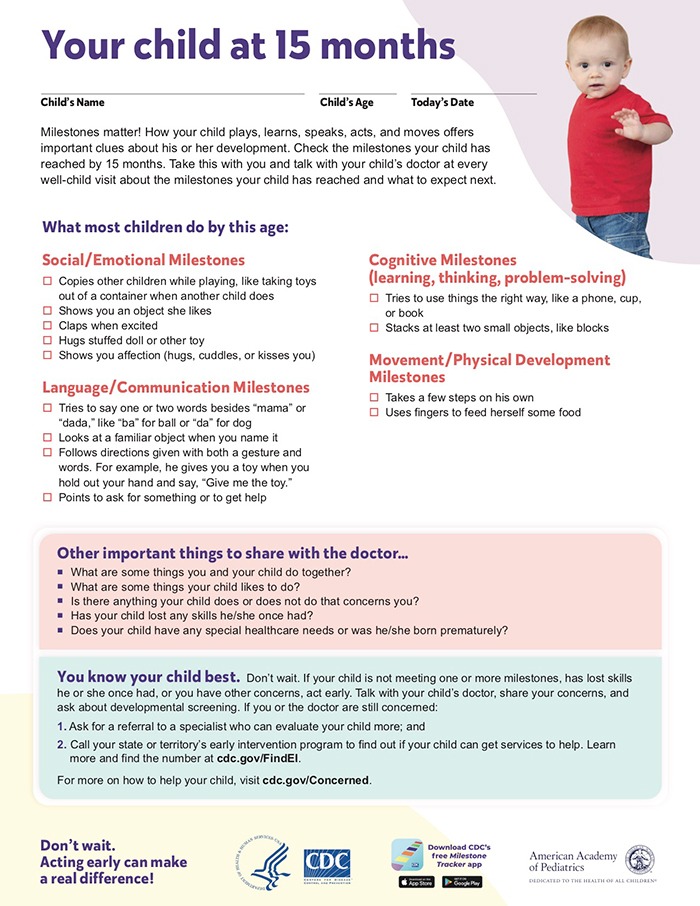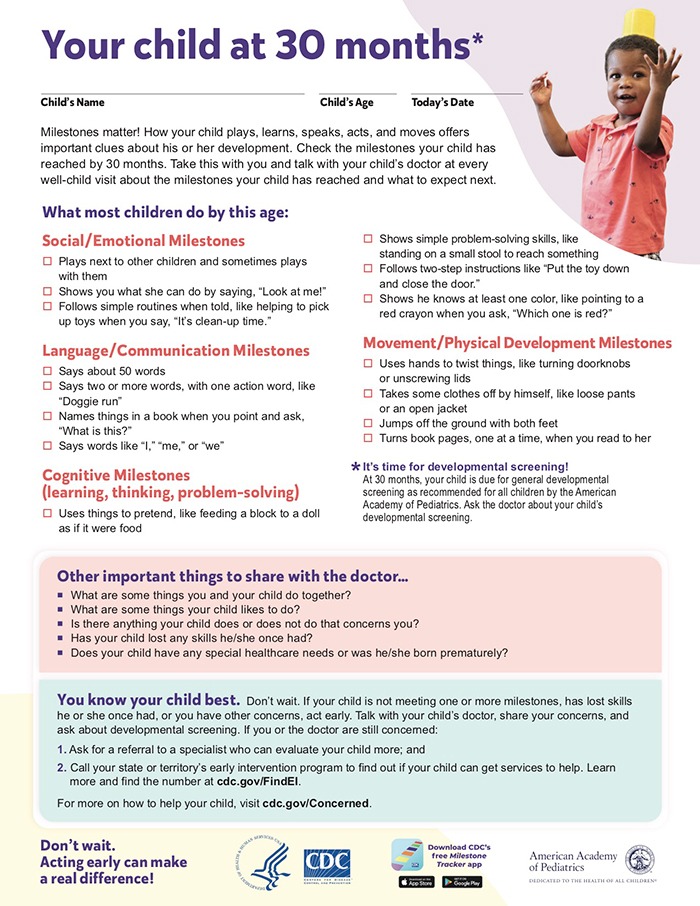Crawling – check. Babbling and smiling – check. Catching a ball – check.
If we have concerns that our child isn’t talking, walking, or learning like they should, we trust these resources to guide us.
Comparing what our child is doing to what age the milestones list certain skills as developing helps us decide when we should consider seeking services to help.
Last month, the organization released an update to developmental milestones for the first time since they were released in 2004. The updated milestones, which show skills expected from age 2 months to 5 years-old, are listed on the CDC’s website here.
The new milestones, particularly those listed for speech and language development, have been discussed a lot in the news lately. Not only are people questioning why the CDC chose to release an update, but they’re also questioning the accuracy of the milestones themselves.
Why the Update?
Some of the standards were lowered by the CDC. For example, the previous expectation was for a child to have a vocabulary of 50 words at 24 months-old. Now it’s listed at 30 months-old.
Twitter posts and stories in the media have speculated that the CDC did this to account for the effects of Covid-19 restrictions. Lockdowns, mask mandates, and social distancing have resulted in an increase in speech delays.
But the CDC maintains that updates to the speech and language milestones have been in development for years. The organization also has a reason behind each change.
Changes Parents Should be Aware of
#1 The Update: Lowered standards for language milestones
What the CDC Says: The previous milestones listed the average age that children achieve a certain skill. The new milestones list the age that most children reach them.
The previous CDC guidelines stated a child should have a vocabulary of 50 words at 24 months because that is the age 50% of children are expected to reach the skill. The new milestones state this skill at 30 months, when 75% of children reach it.
The CDC hopes this will encourage parents and pediatricians to more easily identify possible language delays, and immediately refer children for intervention like Speech Therapy.
The Response: Some professionals worry that the lower standards listed by the CDC will actually encourage some Pediatricians to maintain a wait-and-see approach. This could mean waiting to refer a child for services until a language delay has become more severe.
#2 The Update: Milestones were added and removed
What the CDC Says: Speech and language milestones for the 15-month and 30 month ages were added, which were previously not listed. This was intended to help parents track their child’s developmental skills at more specific ages.
Social-emotional skills were added, like smiling to get attention at 4 months-old. Adding these markers could help increase early identification of children with Autism Spectrum Disorder.
Many milestones were listed repeatedly, at various ages. This redundancy could cause some confusion, so over 216 milestones were removed.
The Response: Most seem to agree that removing duplicate milestones and ambiguous language like “may” and “begins” could help make the checklists more clear to parents. But the milestone of crawling was removed. Some babies skip crawling and move straight to standing and walking. However, crawling has been shown to facilitate the development of cognitive skills, so many feel that skill should have stayed in the updated set of milestones.
#3 The Update: Changes in the milestones themselves
What the CDC Says: Some of the milestones themselves were changed. The updated milestones state a child should be putting words together at 24 months, and saying 50 different words by 30 months-old. According to the CDC, the new milestones were researched and developed by a team of 8 subject matter experts in different fields of child development.
The Response: No Speech-Language Pathologists (“SLPs”), who are considered experts in the areas of speech and language development, were involved in developing the updates to the CDC milestones.
Even the American Speech-Language and Hearing Association (ASHA) issued a statement reporting the organization reached out to the CDC. The association expressed concerns that SLPs were not involved in developing the milestones, and that the updates are marked by “inconsistencies”.
Some of these milestones conflict with what Speech-Language Pathologists typically advise parents – like that a child should speak 200 words at age 2. It’s also widely stated that children must have a vocabulary of 50 words before they start putting them together to make phrases, but the CDC has the timeline of development for these two skills reversed.
How Parents Can Interpret the New Milestones
With all of the controversy surrounding the newly updated CDC milestones, where should parents turn to make sure their child’s development is on track?
Milestones are always meant to be a general guide, and interpreted with caution. Not all children follow the “typical” progression when developing skills.
If you have any concerns about your child’s development, it’s important to bring those up to your child’s pediatrician. The CDC urges parents to utilize screening tools, and offers a helpful guide explaining how to get help.
Services That Can Help
If you have concerns with your child’s speech and language development, consider seeking an evaluation with a Speech-Language Pathologist. Speech therapy can help children who have difficulties with expressive and receptive language skills and delayed social skills, in addition to disordered sound articulation, reading difficulties, and trouble with executive functioning skills.
TherapyWorks offers Speech Therapy with Speech-Language Pathologists with extensive knowledge in speech and language milestones, and experience in evaluating and treating children with speech and language delays.
TherapyWorks offers Speech Therapy, Occupational and Physical Therapy both in person and through teletherapy (nationwide). If you would like to learn more, or discuss your child’s specific needs, please don’t hesitate to reach out to TherapyWorks!






